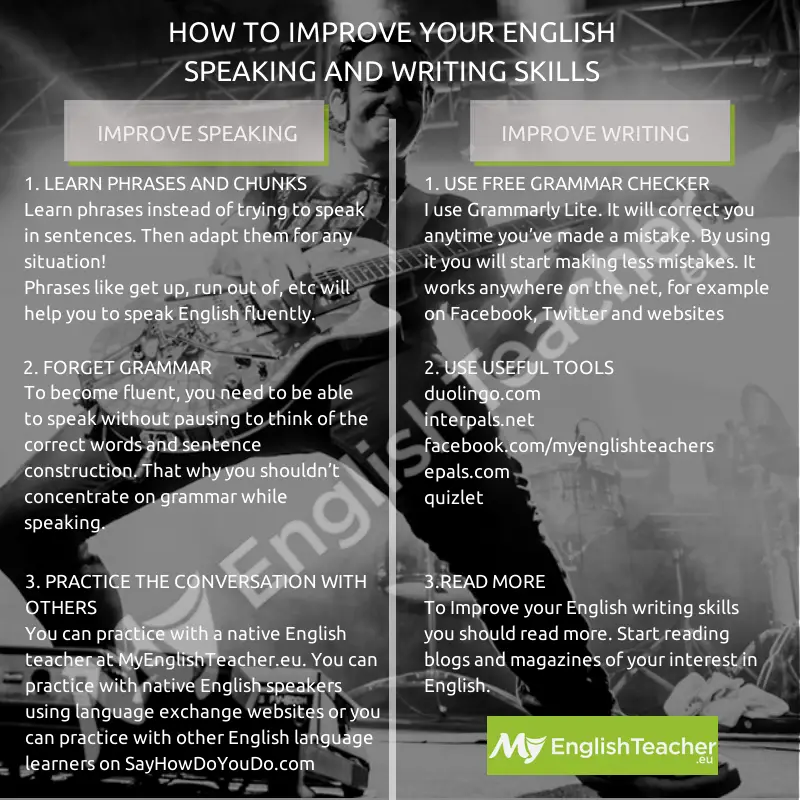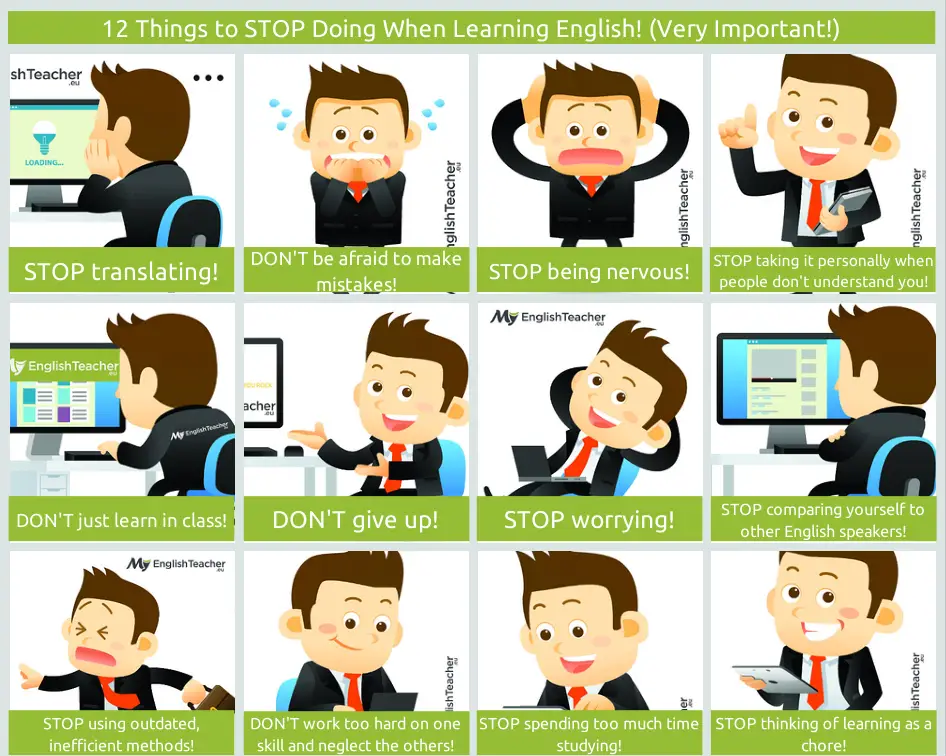Learning a new language can be very difficult, but you can make it easier for yourself by NOT creating barriers that will hinder your process. These tips (in no particular order) should help to make your learning process a lot smoother and make learning English fun!
1. Stop Translating
Translating should be something you need to do in the very early stages of learning English.
Once you have a basic grasp of vocabulary, you should stop thinking in your own language and trying to translate everything, as this slows your progress down and limit your focus.
When someone says something, concentrate on the words you DO know, and build your understanding form there.
2. DON'T be Afraid to Make Mistakes!
Fear can become a huge barrier, which makes it difficult to progress. If you know the rules of grammar, but struggle to hold a conversation - that doesn't mean you should avoid talking in English!
STOP thinking about how people might react, and what they'll say. Everyone makes mistakes, and they learn from them - that is how you get better at it!
3. STOP Negative Self-Talk
Having a negative attitude doesn't help improve your learning, it makes it worse. If you find you're saying negative things to yourself like:
- "Why do I always get it wrong? I'm so stupid."
- "I always make mistakes. I'll never get better at this."
- "I don't know what to say, it's so hard to speak in English"
This needs to change! Try to turn them into positive statements. You can rephrase them to show positivity. Instead of saying "I'll never get better at this", you should say "I'm going to keep trying, I'm sure I'll get better at it soon".
Instead of saying "Sorry, I don't speak English, I don't understand you", say "Sorry, I'm still learning how to speak English, so could you speak a bit slower please?"
Positivity helps you to learn much quicker!
4. Stop Being Nervous!
Speak in English every time you have opportunity. If you think about speaking, then you'll just feel even more nervous. Just put yourself out there, and speak!
The more you speak, the more confident and comfortable you will feel, and the quicker you will learn how to communicate in English properly!
You may need to step out of your comfort zone a little bit, but the more you speak English, the more you will begin to feel relaxed!
5. STOP Taking it Personally when People Don't Understand You!
At some point, you will meet someone who, no matter how hard you try, just can't understand you. This happens all the time.
Due to the large number of English speakers in the world, there is a wide range of accent, some of which, can be hard to understand.
Eliminating your mother tongue from your accent completely, is extreme difficult, so don't be too hard on yourself!
6. STOP Apologising!
No one knows everything - so don't apologise for not speaking English perfectly! You're still learning, everything takes time!
The more you speak and practice your new-found skill, the more you'll improve. Even native English speakers didn't learn how to speak in few months.
7. DON'T Just Learn in Class!
Learning in a classroom environment is great because you get to ask questions, pick your teacher's brain, and share ideas with classmates, but you also need to implement English language into your daily life, and communicate with people in English at every opportunity you get.
If you don't practice speaking English outside the classroom, then your ability to progress will remain very limited. This is one of the most important things you have to remember.
It is the best way to learn, and will definitely influence how quickly you improve!
8. DON'T Give Up!
At first, it's always seems hard when you're learning something new, but if you keep at it - it will become easier!
You have to keep practising if you want to get better, otherwise it'll get harder to improve.
Professional athletes have to do the same, they train hard all the time, because if they didn't - their skills would just get worse!
9. Stop Worrying!
Don't waste a chance to speak English because you're worried about whether they will understand you or not. Be confident, and have an "I can do it" attitude.
Don't be shy! Least of all, don't worry about learning, because it's supposed to be fun. The more fun you have, the easier you'll learn!
10. STOP Comparing Yourself to Other English Speakers!
No matter what level of English you're on, you worked hard to get there. Be proud of what you achieved!
Everybody is different, some people learn languages more easily than others, and some people spend more time working to improve their English. Just because your friend is learning faster than you, doesn't mean you're not on the right path!
11. STOP Using Outdated, Insufficient Method!
Grammar-translation methods, and memorisation of rules have been standard practice for a very long time, but they're probably not the most effective ways to learn.
Some students study English for very many years, and know all the rules of grammar and sentence structure, but still struggle to communicate properly and hold a conversation in English.
It is very important to have significant amount of time focusing on conversational, functional language use, and learn in context through interaction with other people.
12. DON'T Work Too Hard on One Skill and Neglect the Others!
If you just want to be able to speak to people, then you might place less emphasis on reading and writing, but you shouldn't neglect them too much, as they're also crucial for fluency.
You shouldn't concentrate on improving your speaking skills, but also dedicate a suitable amount of time practising your reading, writing and listening skills. You shouldn't underestimate the benefits all these skills have on each other!
13. STOP Spending Too Much Time Studying!
If you sit in front of a book or screen for hours, going over the same rules and flashcards again and again, it won't make you learn any faster!
You should have short study periods up to 30 minutes, then spend a generous amount of your available time putting the language skills you've learnt, into practice.
It's okay to study for up to 30 minutes, take a break, then go back to studying if you need to, but studying for a long period of time, without taking a break, is quite exhausting for your brain!
14. STOP Thinking of Learning as a Chore!
Learners
sometimes associate study with something that is unpleasant, which turns it
into ‘boring homework’, and ‘boring exercises’.
Even if they
realise that learning is important, they may not be self-motivated enough to do
it all the time! It needs to be something you want to do, not have to
do. Make it interesting so you have fun when you’re learning.
- If you're walking down the street, build simple English sentences in your head about the things you see around you.
- Learn a new word each day and try to use it in conversation.
- Watch a funny video on the Internet and tell someone what it's about.
- Read an article about your favourite band (or something else that interests you)
- Communicate with people on a discussion forum.
Soon you will
stop thinking of boring classes, difficult grammar rules or lengthy homework –
instead you’ll be thinking about a funny English TV show, your favourite band,
or interesting conversations with different people – in English!
Only one kind of
person would do these sort of things – the kind of person who enjoys them! If
you want to learn how to speak English well, you have to be that person.
Have you ever heard of anyone who became successful by doing something they
hated?
15. DON'T Disregard the Culture!
Language is made up of so many intricate expressions of culture, that it is impossible for books and courses to cover them adequately.
For example, the way an average, ordinary person interacts with other people in his or her community. All cultures and small communities have different gestures, intonation, slang terms, proximity, interjections, filters and short cuts!
If you're focusing on learning the tongue of a certain community then it would be best to integrate with them, and learn from them!
(Taken from: https://www.facebook.com/myenglishteachers)
Comments from the authors:
| The Authors |
Comments |
| Yumiz |
This is a very good guide for English learners! |
| Charmaine |
These are very good advice! |
| Premilah |
These makes English learning much easier! |
| Wendy |
learn a lot from this! |
| Rajeswari |
These will certainly enhance many people's English proficiency and enlighten with some knowledge on English communication as well. |


























